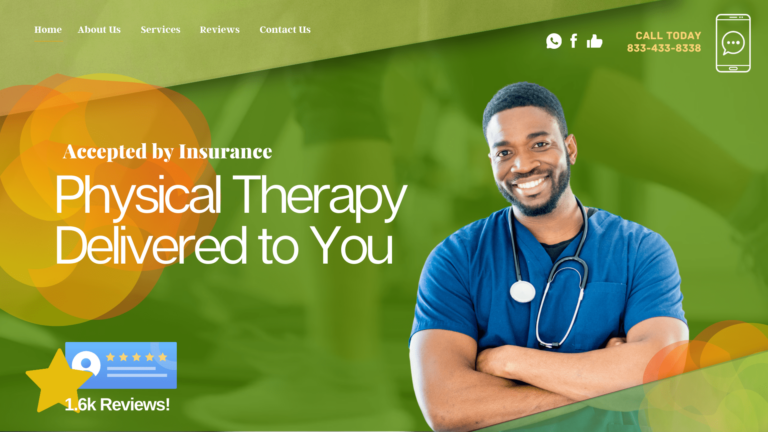Recent decades have changed how medical professionals engage with their patients. Patients used to need to visit their doctor’s office or call to reach their healthcare providers. Now, healthcare providers from all specialties use websites to share information, attract new patients, and connect with current ones.
Website speed is critical to your patient experience and healthcare SEO rankings. Solo practitioners and major medical groups must ensure their websites are quick to load, responsive, and easy to use.

How Website Speed Is Crucial for Healthcare SEO
Search Engine Optimization (SEO) is a critical topic in the marketing and web design industries. Effective healthcare SEO techniques ensure your website ranks and retains customers.
The most common conversations surrounding SEO focus on keywords. These conversations include meta descriptions, catchy topic titles, and image alt text. While equally important, people don’t consider website speed nearly as often as they should.
The effect of your website speed on patient experience is clear. However, its influence begins even earlier. In fact, it influences your SEO rankings before patients see your site, as search engines account for website speed in your rankings.
Website owners and designers often overlook this fact, so their websites rank lower than they should.
- Influence on Search Rankings: Usability is an important factor that affects your site’s ranking. Your site’s web speed is a cornerstone of this rating. Visitors will leave a slow-loading site, increasing bounce rates. Although the system doesn’t directly rate the bounce rate, it negatively influences the projected user experience.
- Mobile Optimization: Over half of all medical website visits are from users browsing their mobile devices. If your website speed is low on a desktop, it’s often glacial on mobile devices, and that’s bad news for your rankings. Google uses a method called mobile-first indexing. This looks at the mobile version of your website for ranking and indexing.
- Efficient Search Engine Crawling: Crawlers or spiders are terms for special software that SEO engines use to index sites. When sites load slowly, this process disrupts, which means they may only partially index your site. All the hard work put into SEO on your site only matters if these bots stick around long enough to find it.
- Dwell Time and Positive UX Signals: Another core metric influencing SEO is “dwell time.” This measures the amount of time that a user spends on your site. Longer dwell times represent a positive user experience and more interaction with your content. Fast web speed, valuable information, and user-friendly design encourage dwell time, which helps improve rankings.
These four factors have a major influence on your healthcare SEO, and they’re all indelibly tied to web speed. They highlight how slow web speeds can mean visitors never see your site or don’t stay long if they find it.
How Website Speed Enhances Patient Engagement
Once patients arrive on your site, web speed continues to impact their experience. Visitors want to be able to access the information they came to find quickly and easily. If your site has slow loading times, that can lead to frustration and the decision to look elsewhere.
Providing a great patient experience is a proven way of driving patient engagement. Studies have shown that a smooth, frustration-free experience builds trust and authority.
Website Speed and Patient Engagement
- Improved First Impressions: When your site effectively uses SEO, it’s your patient’s first impression of your practice. A reactive, easy-to-navigate site with smooth web speeds conveys professionalism, competence, and reliability. Having a slower site risks driving prospective patients to your competitors.
- Easy Access To Vital Information: Patients visiting your site seek important information about your practice and healthcare. They may be learning more about your suggested treatments or procedures or accessing your patient portal. Fast-loading pages make this information easy to access and show respect for your patient’s time and concerns.
- Higher Conversion Rates: Smooth web speed is a major driver of conversion rates; the rate visitors become patients. This not only improves the patient experience but also removes barriers. It helps patients make decisions and act on them. Your page loading time could mean a new patient appointment or a lost opportunity.
- Enhanced Trust and Credibility: Every patient expects professionalism from their healthcare provider. This goes beyond their in-office experience; patients also look for it online. A smoothly running website develops a sense of trust in the user, while slow web speeds can undermine your credibility.
- Seamless Multi-Device Experience: Patients will likely access your site from various devices, including tablets, phones, and PCs. They expect to be able to access your website easily across these platforms. Smooth web speed and responsive design are core pieces of providing a consistent and satisfying experience.
- Improved Retention and Loyalty: When your website provides a smooth experience, free from frustrations or slowdowns, it ensures a great patient experience. Satisfying online interactions is one of the things that modern patients expect from their providers. They want to easily find educational content, schedule appointments, and get test results online without hassle. Smooth web speeds help to provide this experience, fostering trust and loyalty in your patients.
- Supports Educational Resources: Patient education has become a keystone of modern healthcare practices. This new expectation means it’s vital that you provide easy-to-access educational material to your patients. Whether your site hosts blogs, videos, downloadable guides, or all three, your web speed will determine how easy it is to access.
- Better Accessibility for Time-Sensitive Needs: Modern patients value accessing their healthcare information quickly and easily. They want to ease their health concerns by quickly scheduling an appointment or finding emergency contact information. Fast web speed ensures that they can do this with the tap of a screen.

Tips To Optimize Your Site For Fast Web Speed
Various ways exist to enhance web speed, such as reducing overhead, optimizing code, and maintaining your site. If someone on your team has the right technical skills, these improvements will help reduce loading times and boost responsiveness.
- Image Optimization: Not all images are created equal, even those of the same visual size. If you upload images to your website without taking additional steps, you carry unnecessary data overhead. Optimization programs like Optimizilla can lower an image’s file size without losing clarity. These smaller file sizes lead to faster web speeds on sites with many images.
- Minimize Code: There is a difference between code that works and clean, efficient, and streamlined code. Just because you can create a beautiful website with HTML, CSS, and JavaScript doesn’t mean you have optimized it. Some techniques, such as lazy loading, can enhance your site’s performance. Use these options whenever possible.
- Find A Hosting Service With Servers Near You: You must consider many factors when selecting a hosting site. Perhaps most important is its proximity to the area your clinic services. While you may be able to find reduced rates overseas, these come with increased latency times. Latency is the time it takes for visitors to communicate with your site and for it to respond.
- Choose A Hosting Service With A Good Track Record: Your hosting service greatly influences your site’s performance. In addition to providing servers near your service area, you want to check their past performance and reviews. Check to see if they have frequent downtimes and what customers say about their ticket response times.
- Use a Content Delivery Network (CDN): To ensure your patients can always access your website, use a CDN for hosting. These networks provide infrastructure that hosts your website’s data on multiple servers simultaneously. This ensures that your site remains available to users even if one server goes down or is inaccessible. Also, your visitors will be sent to the site with the fastest access times.
- Regularly Monitor and Test Your Site: Staying vigilant is essential for your website to perform effectively over time. Google PageSpeed Insights, GTmetrix, or Pingdom are common tools for tracking web speed. You should use these regularly to assess your site’s speed and identify areas for improvement. Routine checks ensure your site remains fast and efficient as technology evolves.
- Implement Caching: This process stores frequently accessed information, increasing web speed and page load times. When developing your website, be certain that you use caching to store necessary information on your user’s browser. Caching can also be used to store information on your server to ensure that it is readily available to visitors. Properly implemented, it will streamline load times and improve web speed.
- Enable Compression: One effective way of reducing load times on your site is through compression. Gzip compression is a common tool used to reduce the size of your files prior to sending them to the user. HTML, CSS, and Javascript files can all be compacted by as much as 90%, greatly improving transfer times. This makes your site more accessible to patients using slower internet connections. Setting up this process can often be done through your hosting service, or professionals can handle it for you. Compression is easily the most essential and low-effort option for optimizing web speed.
When implemented by an expert hand, these practices will enormously increase the speed and efficiency of your site. As a result, your clinic will offer a better experience for patients. This will keep visitors longer and turn more of them into patients.

Why Leave Website Speed Optimization to Professionals?
Unless you’re an experienced web design specialist, many of the above tips likely seemed intimidating. If you understand the topic, you know how much time effective web design and optimization require. This is among many who decide to place their website in the hands of experts.
- Expertise in Technical Optimization: Website technology constantly advances, and staying on top of these innovations is constant work. New options for server configuration, data optimization methods, and caching technology may provide significant benefits for your site. Understanding these innovations requires skill and time, which are essential parts of being a professional developer.
- Customized Solutions for Healthcare Websites: Every healthcare practice is unique and needs its own tailored website solutions. Your practice needs a website that shows its culture. Patient portals, scheduling software, and other aspects work best with a bespoke, professional touch.
- Long-Term Maintenance and Updates: Website optimization is not a one-time task. You need a team of experts for ongoing support. Your expert team will adjust to changes in search engine algorithms. This team will also work to keep security software updated and ensure your website runs quickly.
- Trusted Security: Reliable security is critical when it comes to patient trust. The world of cybersecurity is an arms race, with security tools and infiltrator tools in constant competition. With a trusted team of web development professionals at your disposal, you can rest easy knowing your site is protected.
- HIPPA Compliance: HIPPA compliance is a special consideration in the medical industry. Healthcare websites often contain or provide access to patients’ sensitive information. Maintaining compliance with HIPPA is essential to your site providing a positive patient experience. Having an expert team manage your site ensures your patients’ information will be protected.
The most valuable resource you protect when using web design professionals for your website is time. Your time is best used to attend to your patients and ensure your practice runs smoothly. This is an important task that deserves your full attention, a possible goal when you leave it to the professionals.
Leave It To The Leaders In Medical Website Hosting And Design
When you’re dedicated to delivering the best experience to your patients, in the office and out, give Opt360 a call. As the leaders in medical website development, support, and hosting, we guarantee results when you partner with us. We’ll work with you to develop a beautiful website specifically tailored to your practice and the people it serves.
When you trust us with your site, you will see more visitors and better conversions, and your patients will have a smoother experience. Contact us today to start and schedule a consultation!













